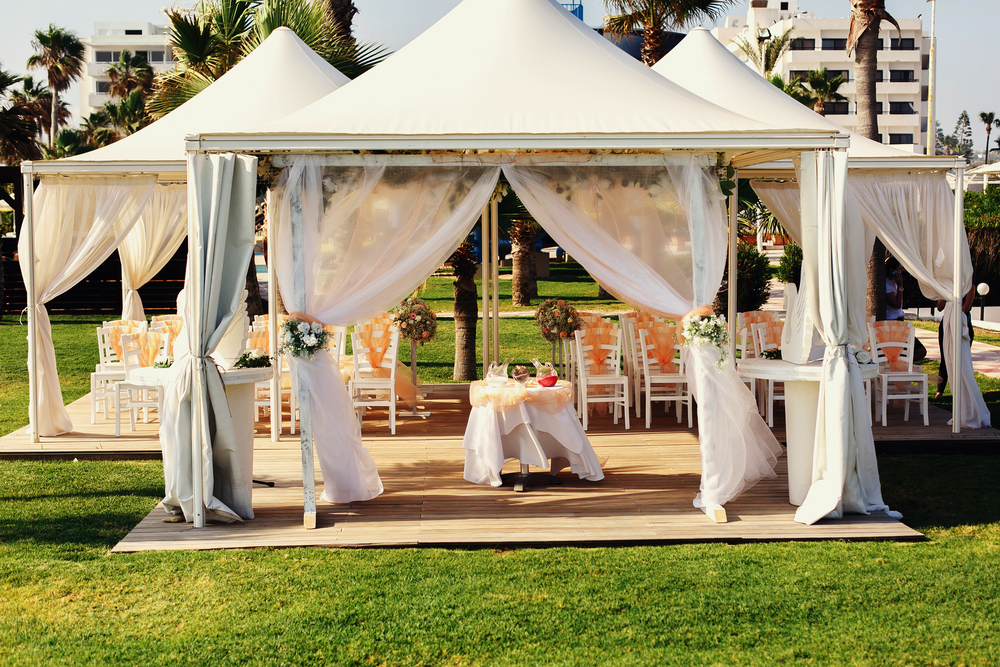How To Rent a Tent for Your Wedding Reception

If you’re getting hitched in the great outdoors, you’ll probably need to rent a tent. They offer protection for your guests, vendors, food, drink, and equipment. But there’s more to renting one than making a phone call or sending an email. Before you book your outdoor tent, there are a few important details you should know.
Will a Tent Work at Your Venue?
Just because your prospective wedding site is outdoors doesn’t mean that you can install a tent there. Wedding Wire Canada’s Alice Prendergast explains that you’ll need solid level ground that’s not too soft. A few small dips and bumps are no big deal, but avoid sloping, pitted, or uneven areas. You’ll also need flooring with your tent. Most providers already include it, so you can choose between wood, canvas, or carpet.
Besides ground quality, you should also think about power needs. Unless you’re near an indoor building with a reliable power source, you’ll likely need a generator. It ensures that lighting, sound, HVAC, food service, and other equipment stay on throughout your event.
While you’re at it, don’t forget about parking and restroom access. Your desired venue should have enough space for guests to park. Depending on available facilities, you may have to rent portable toilets. Make sure that your rental bathroom provider can include accessible toilets for guests with disabilities.
What Type of Tent Do You Need?
Outdoor event tents are not one-size-fits-all. You should consider your site, guests, desired style, and typical weather patterns when choosing your tent. In another Wedding Wire Canada piece, Prendergast lists the seven common types you’ll find on the market: frame, pole, marquee, stretch, sailcloth, transparent, and yurt. Each type has a distinctive design:
- Frame tents pair a canopy with a metal frame.
- Pole tents include sturdy poles at the center and sides.
- Marquee tents use a frame that includes a peaked center without using a central pole.
- Stretch tents extend large pieces of material over several evenly-spaced securing poles.
- Sailcloth tents incorporate several poles at the base and one in the center to hold up a canopy.
- Transparent tents include frame tent bases to support see-through canopies.
- Yurts are circular tents with lattice walls and wooden ribbed roofs supporting fabric canopies.
So which type of tent should you choose? Frame, marquee, and transparent tents are ideal for most types of terrain. Yurts are limited in size, so they’re best for smaller weddings. Pole and sailcloth tents require a center pole to anchor into the ground. Stretch tents can work well at unusual venues – think large decks or rooftops.
How Much Will a Tent Cost?
A Practical Wedding reveals that tent prices also include sidewalls, flooring, lighting, catering accommodations, and a stage for entertainers. Added together, these can equal or exceed the base tent rental price. The example figures from author Meg Hotchkiss are in U.S. dollars, but they should give you a rough idea. Get a detailed quote from each prospective vendor. These should be detailed with delivery, setup, any required permit fees, and tent breakdown.
What Other Details Should You Consider?
Before you go all in on a tent – or even book an outdoor venue – you need to know if your plan is feasible. Writing for Brides, event expert Anna Price Olson suggests checking your prospective site’s rules. It may prohibit staking into the ground or limit noise past a certain time. You should also inquire when your tent provider can come and set up. Keep in mind that this can take one to four days.
Renting a wedding tent doesn’t just shield your guests, food, and equipment from the elements. When properly set up, it helps you create the right mood and atmosphere. Your budget, event needs, and site feasibility should guide your decision to rent.

